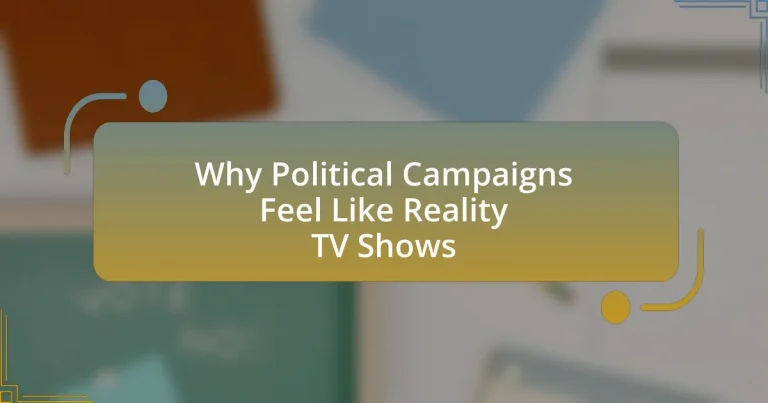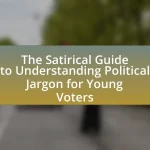Political campaigns increasingly resemble reality TV shows due to their reliance on spectacle, drama, and personal branding to engage audiences. Both formats utilize strategic messaging, emotional appeals, and visual storytelling, often highlighting conflicts and personal narratives to maintain viewer interest. The article explores the similarities between political campaigns and reality TV, including the use of social media for audience engagement, the crafting of public personas, and the impact of media framing on public perception. It also examines the psychological factors that contribute to the appeal of this trend, the implications for voter engagement, and the challenges candidates face in maintaining authenticity in a performative environment.
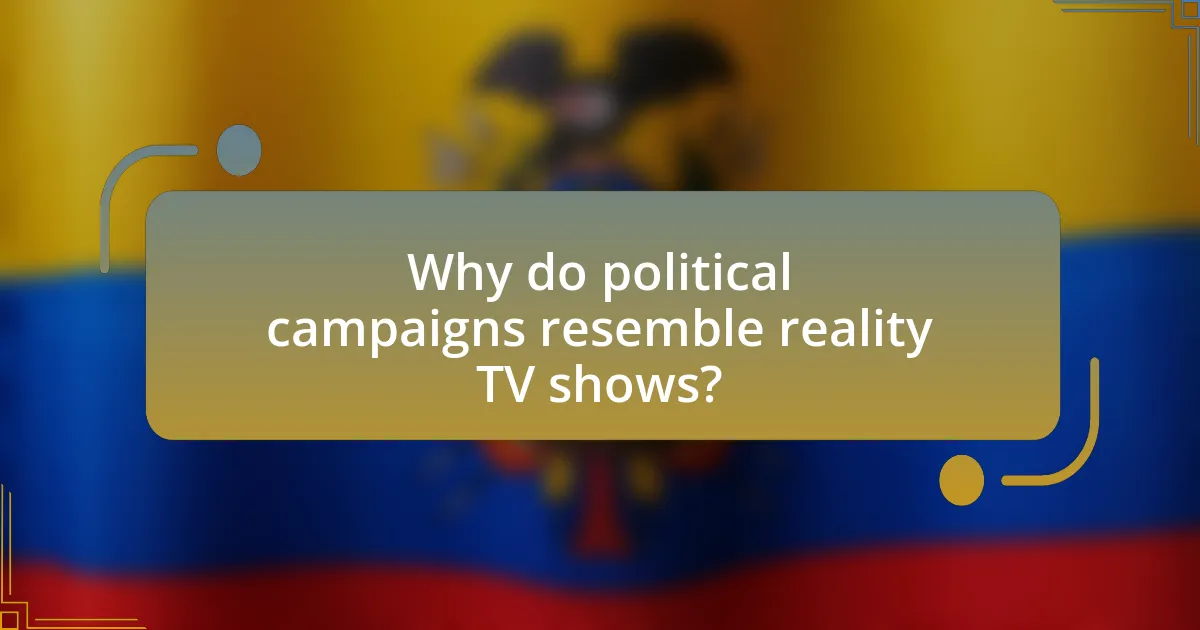
Why do political campaigns resemble reality TV shows?
Political campaigns resemble reality TV shows because both rely heavily on spectacle, drama, and personal branding to engage audiences. Campaigns utilize strategic messaging, emotional appeals, and visual storytelling, similar to reality TV, to capture public attention and create memorable narratives. For instance, candidates often stage events that emphasize conflict or highlight personal stories, mirroring the dramatic arcs found in reality television. This approach is supported by research indicating that emotional engagement significantly influences voter behavior, as seen in studies by political scientists who analyze media effects on public opinion.
What are the key similarities between political campaigns and reality TV shows?
Political campaigns and reality TV shows share key similarities in their use of drama, character development, and audience engagement strategies. Both rely on creating compelling narratives that captivate viewers, often highlighting conflicts and personal stories to maintain interest. For instance, political candidates often craft their public personas and narratives similarly to reality TV contestants, focusing on relatable traits or dramatic moments to resonate with the audience. Additionally, both formats utilize social media and public appearances to engage and mobilize their audiences, leveraging platforms for real-time feedback and interaction. This engagement is crucial, as studies show that emotional connections significantly influence voter behavior and viewer loyalty in reality TV.
How do both formats utilize drama and conflict to engage audiences?
Both political campaigns and reality TV shows utilize drama and conflict to engage audiences by creating high-stakes situations that evoke emotional responses. Political campaigns often highlight contentious issues, rivalries, and personal attacks, which generate tension and keep viewers invested in the outcome. Similarly, reality TV shows thrive on interpersonal conflicts, dramatic twists, and competitive scenarios that captivate audiences. Research indicates that viewers are drawn to conflict because it stimulates interest and discussion, as seen in studies analyzing viewer engagement metrics during contentious political debates and reality show confrontations. This shared reliance on drama and conflict effectively maintains audience attention and fosters a sense of involvement in the narrative.
In what ways do candidates and reality TV stars craft their public personas?
Candidates and reality TV stars craft their public personas through strategic branding, media manipulation, and audience engagement. They utilize social media platforms to curate their images, often presenting a polished version of themselves that resonates with their target demographics. For instance, candidates may adopt specific slogans and visual styles that align with their political messages, while reality TV stars often highlight particular traits or storylines that enhance their appeal. Research indicates that both groups engage in narrative construction, where they shape their life stories to evoke emotional responses from their audiences, thereby fostering a connection that can influence public perception and support.
How has the media landscape influenced the perception of political campaigns?
The media landscape has significantly influenced the perception of political campaigns by transforming them into highly produced events that resemble reality TV shows. This shift is evident in the way candidates utilize social media platforms, such as Twitter and Instagram, to craft their public personas and engage directly with voters, often prioritizing entertainment value over substantive policy discussions. For instance, the 2008 presidential campaign of Barack Obama effectively leveraged social media to create a narrative that resonated with younger voters, showcasing the power of media in shaping public perception. Additionally, the rise of 24-hour news cycles and the emphasis on sensationalism have led to a focus on candidates’ personalities and dramatic moments rather than their political platforms, further blurring the lines between politics and entertainment.
What role does social media play in shaping campaign narratives?
Social media plays a crucial role in shaping campaign narratives by providing a platform for real-time communication and engagement between candidates and voters. This immediacy allows campaigns to craft and disseminate their messages quickly, adapting narratives based on audience reactions and trending topics. For instance, during the 2016 U.S. presidential election, Donald Trump’s use of Twitter enabled him to directly influence public discourse and media coverage, often bypassing traditional media filters. Studies indicate that social media can amplify specific narratives, as seen in the 2020 election, where platforms like Facebook and Instagram were pivotal in mobilizing voter turnout and shaping perceptions through targeted advertising and influencer partnerships.
How do news coverage and entertainment media blur the lines between politics and entertainment?
News coverage and entertainment media blur the lines between politics and entertainment by framing political events in a sensationalized manner that prioritizes drama over substance. This phenomenon is evident in the way political figures are portrayed as celebrities, with their personal lives and public personas often receiving more attention than their policies or governance. For instance, the extensive media coverage of Donald Trump’s reality TV background during his presidential campaign exemplifies how entertainment narratives can dominate political discourse, leading to a focus on spectacle rather than critical analysis of political issues. This blending of genres results in audiences consuming political information through an entertainment lens, which can distort public perception and engagement with serious political matters.
What psychological factors contribute to the appeal of political campaigns as entertainment?
The psychological factors contributing to the appeal of political campaigns as entertainment include the human tendency for narrative engagement, social identity formation, and emotional arousal. Narrative engagement occurs as audiences become invested in the stories and characters presented during campaigns, similar to reality TV, where viewers form attachments to contestants. Social identity formation is evident as individuals align themselves with candidates or parties that reflect their values, fostering a sense of belonging and community. Emotional arousal is heightened through dramatic moments, conflicts, and personal stories, which captivate viewers and elicit strong emotional responses. Research by the Pew Research Center indicates that emotional engagement significantly influences voter behavior, demonstrating that the entertainment aspect of political campaigns can enhance public interest and participation.
How do viewers’ emotional responses to candidates mirror those towards reality TV characters?
Viewers’ emotional responses to political candidates often mirror those towards reality TV characters due to the shared elements of drama, conflict, and relatability. Both contexts elicit strong emotional engagement through storytelling techniques that highlight personal struggles, triumphs, and interpersonal dynamics. Research indicates that audiences develop parasocial relationships with both candidates and reality TV figures, leading to feelings of empathy, admiration, or disdain. For instance, a study published in the Journal of Broadcasting & Electronic Media found that viewers often project their own experiences onto these figures, enhancing their emotional investment. This phenomenon illustrates how the narrative structures and character arcs in both political campaigns and reality television create similar emotional landscapes for viewers.
What impact does audience engagement have on the success of political campaigns?
Audience engagement significantly enhances the success of political campaigns by fostering a deeper connection between candidates and voters. Engaged audiences are more likely to participate in discussions, share campaign messages, and mobilize support, which can lead to increased voter turnout. For instance, a study by the Pew Research Center found that campaigns utilizing social media effectively to engage audiences saw a 20% increase in voter participation compared to those that did not. This demonstrates that active audience involvement not only amplifies campaign visibility but also translates into tangible electoral outcomes.
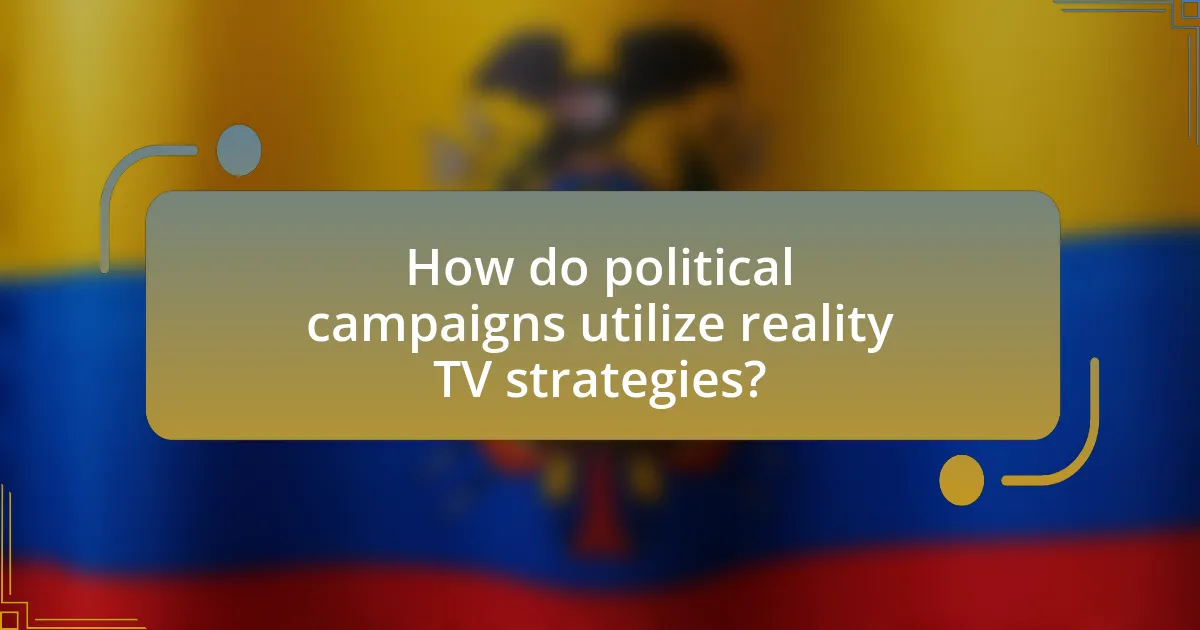
How do political campaigns utilize reality TV strategies?
Political campaigns utilize reality TV strategies by employing dramatic storytelling, character development, and audience engagement techniques to create a compelling narrative around candidates. These campaigns often mimic the episodic format of reality shows, presenting candidates in relatable situations to build emotional connections with voters. For instance, the 2016 U.S. presidential campaign of Donald Trump heavily relied on media spectacle and controversy, similar to reality TV formats, which helped him dominate news cycles and maintain public interest. This approach is supported by research indicating that candidates who engage in entertaining and relatable content can enhance their visibility and appeal, ultimately influencing voter perceptions and behavior.
What specific tactics do campaigns borrow from reality television?
Political campaigns borrow specific tactics from reality television, including the use of dramatic storytelling, character development, and strategic editing to create compelling narratives. These tactics engage audiences emotionally, similar to how reality shows captivate viewers by showcasing personal conflicts and relatable moments. For instance, campaigns often highlight personal stories of candidates or voters to humanize them, mirroring the emotional arcs found in reality TV. Additionally, the use of social media platforms for real-time engagement and audience interaction reflects the participatory nature of reality television, where viewers feel involved in the unfolding drama. This approach has been validated by studies showing that emotional engagement significantly influences voter behavior and perception, making these tactics effective in shaping public opinion.
How do sound bites and catchphrases function similarly in both realms?
Sound bites and catchphrases function similarly in both political campaigns and reality TV by distilling complex ideas into memorable, easily digestible phrases that resonate with audiences. Both serve to capture attention quickly, allowing for effective communication of key messages in a fast-paced environment. For instance, political candidates often use sound bites during debates to convey their stance succinctly, while reality TV characters employ catchphrases to create memorable moments that engage viewers. This strategic use of language enhances relatability and emotional connection, making it easier for audiences to remember and share these phrases, thereby amplifying their impact.
What role does editing and narrative framing play in shaping public perception?
Editing and narrative framing significantly influence public perception by selectively presenting information to create specific interpretations. For instance, in political campaigns, the way events are edited and framed can highlight certain attributes of candidates while downplaying others, thus shaping voter opinions. Research by the Pew Research Center indicates that media framing can affect how audiences perceive political issues, with different narratives leading to varying levels of support or opposition among the public. This demonstrates that the choices made in editing and narrative construction are crucial in guiding how information is understood and reacted to by the audience.
How do candidates create compelling storylines during their campaigns?
Candidates create compelling storylines during their campaigns by crafting narratives that resonate emotionally with voters. They utilize personal anecdotes, relatable experiences, and clear messaging to connect with their audience. For instance, successful candidates often highlight their backgrounds, struggles, and triumphs, making them appear more human and accessible. This approach is supported by research indicating that emotional storytelling can significantly influence voter perception and engagement, as seen in the 2008 Obama campaign, which effectively used personal stories to build a strong narrative around hope and change.
What strategies do they use to build suspense and maintain viewer interest?
Political campaigns build suspense and maintain viewer interest through strategic storytelling, cliffhangers, and emotional engagement. Campaigns often present narratives that highlight conflict, such as contrasting candidates’ positions, which creates tension and keeps audiences invested. Additionally, the use of real-time updates and unexpected developments, similar to reality TV plot twists, ensures that viewers remain engaged and eager for the next installment. Research indicates that emotional appeals, such as personal stories or relatable experiences, significantly enhance viewer connection and interest, making the campaign feel more like a dramatic series than a traditional political process.
How do personal stories and backgrounds enhance a candidate’s relatability?
Personal stories and backgrounds enhance a candidate’s relatability by creating emotional connections with voters. When candidates share their personal experiences, they humanize themselves, allowing voters to see them as individuals rather than just political figures. This connection is supported by research indicating that voters are more likely to support candidates who they perceive as relatable and authentic. For instance, a study published in the Journal of Political Marketing found that candidates who effectively communicated their personal narratives were viewed more favorably by constituents, leading to increased voter engagement and support.
What lessons can political campaigns learn from successful reality TV shows?
Political campaigns can learn the importance of storytelling and emotional engagement from successful reality TV shows. Reality TV captivates audiences through compelling narratives and relatable characters, which can be mirrored in political messaging to create a strong emotional connection with voters. For instance, shows like “The Apprentice” effectively used personal stories and conflicts to engage viewers, demonstrating that relatable content can enhance audience investment. Additionally, reality TV often employs strategic editing to highlight key moments, a technique that campaigns can adopt to emphasize their candidate’s strengths and values in a concise manner. This approach can lead to increased visibility and voter support, as evidenced by the rise in popularity of candidates who effectively utilize media to craft their public persona.
How can campaigns effectively manage their image and brand?
Campaigns can effectively manage their image and brand by utilizing strategic communication, consistent messaging, and active engagement with their audience. Strategic communication involves crafting clear and compelling narratives that resonate with voters, while consistent messaging ensures that all campaign materials align with the core values and objectives of the campaign. Active engagement, through social media and public appearances, allows campaigns to build relationships with constituents and respond to their concerns in real-time. Research indicates that campaigns that maintain a strong, coherent brand identity are more likely to influence voter perceptions and increase support, as seen in the 2008 Obama campaign, which effectively used social media to create a relatable and engaging brand image.
What are the risks of over-dramatization in political messaging?
Over-dramatization in political messaging risks distorting public perception and undermining trust in political institutions. When messages are exaggerated, they can create a false sense of urgency or crisis, leading to heightened anxiety among the electorate. This phenomenon can result in polarized opinions, as individuals may react emotionally rather than rationally, making it difficult to engage in constructive dialogue. Furthermore, over-dramatization can diminish the credibility of political figures, as voters may become skeptical of claims that seem sensationalized or manipulative. Historical examples, such as the use of fear tactics in political advertising, illustrate how such strategies can backfire, leading to voter apathy or backlash against the candidates employing them.
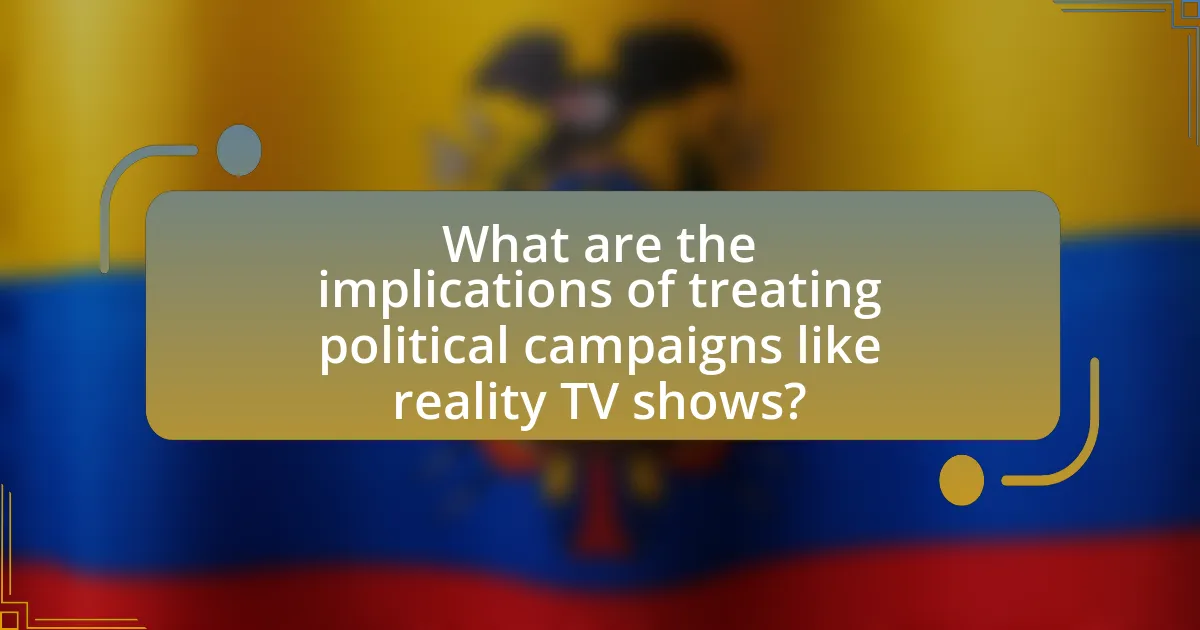
What are the implications of treating political campaigns like reality TV shows?
Treating political campaigns like reality TV shows leads to a focus on entertainment over substantive policy discussions. This shift can result in voters prioritizing charisma and spectacle over qualifications and issues, potentially undermining democratic processes. For example, the rise of candidates like Donald Trump, who utilized media strategies akin to reality TV, illustrates how personality-driven campaigns can overshadow traditional political discourse, as evidenced by his significant media coverage and public engagement during the 2016 election cycle. Consequently, this trend may foster a more polarized electorate, as sensationalism often appeals to emotions rather than rational debate, impacting the overall quality of political engagement and decision-making among voters.
How does this trend affect voter engagement and participation?
The trend of political campaigns resembling reality TV shows significantly increases voter engagement and participation. This phenomenon captures public attention through entertainment elements, making politics more relatable and accessible. For instance, studies have shown that campaigns utilizing engaging narratives and charismatic candidates can lead to higher voter turnout; the 2008 U.S. presidential election saw a turnout of 61.6%, partly attributed to the engaging nature of Barack Obama’s campaign. Additionally, the use of social media platforms, akin to reality TV interactions, fosters direct communication between candidates and voters, further enhancing participation.
What are the potential benefits of increased interest in politics through entertainment?
Increased interest in politics through entertainment can enhance civic engagement and voter participation. When political issues are presented in an entertaining format, such as through television shows or films, they become more accessible and relatable to a broader audience. This accessibility can lead to higher levels of awareness about political processes and issues, as evidenced by studies showing that individuals who consume political content through entertainment media are more likely to discuss these topics and participate in elections. For instance, a study by the Pew Research Center found that 61% of young adults reported being more informed about political issues after watching political satire shows. This indicates that entertainment can serve as a powerful tool for educating the public and motivating them to engage in the democratic process.
What drawbacks might arise from the trivialization of serious political issues?
Trivialization of serious political issues can lead to a lack of informed public discourse. When complex topics are oversimplified or presented in a sensational manner, citizens may not fully understand the implications of policies or the importance of civic engagement. This can result in apathy towards voting and political participation, as evidenced by lower voter turnout rates in elections where issues are not adequately addressed. Furthermore, trivialization can foster misinformation, as soundbites replace nuanced discussions, leading to a misinformed electorate that struggles to make educated decisions.
How does the reality TV approach impact the integrity of political discourse?
The reality TV approach undermines the integrity of political discourse by prioritizing entertainment over substantive debate. This shift leads to superficial engagement with political issues, as candidates often focus on dramatic presentation rather than policy discussions. For instance, studies have shown that political campaigns increasingly resemble reality TV formats, where sound bites and personal narratives overshadow detailed policy analysis, resulting in a less informed electorate. This trend can be observed in the rise of social media platforms, where viral moments often take precedence over meaningful dialogue, further eroding the quality of political conversation.
What challenges do candidates face in maintaining authenticity in a performative environment?
Candidates face significant challenges in maintaining authenticity in a performative environment due to the pressure to conform to scripted narratives and public expectations. This pressure often leads candidates to prioritize image management over genuine self-expression, resulting in a disconnect between their true beliefs and public personas. Research indicates that candidates frequently engage in strategic behavior to appeal to diverse voter bases, which can further dilute their authenticity. For example, a study by the Pew Research Center found that 70% of voters believe candidates often change their positions to gain support, highlighting the struggle between authenticity and performative behavior in political campaigns.
How can voters critically assess the information presented in this format?
Voters can critically assess the information presented in the format of political campaigns resembling reality TV shows by analyzing the authenticity and intent behind the messaging. This involves scrutinizing the sources of information, evaluating the credibility of the candidates, and recognizing the emotional appeals used to engage audiences. Research indicates that voters who engage in media literacy practices, such as cross-referencing facts and understanding the techniques of persuasion, are better equipped to discern the underlying motives of campaign narratives. For instance, a study by the Pew Research Center found that individuals who actively seek diverse viewpoints are more likely to identify bias and misinformation in political content.
What practical strategies can voters use to navigate political campaigns influenced by reality TV?
Voters can navigate political campaigns influenced by reality TV by critically evaluating candidates’ messages and focusing on their policy positions rather than entertainment value. This approach is essential because reality TV often emphasizes personality and drama over substantive issues, which can mislead voters.
To implement this strategy, voters should research candidates’ platforms through reliable sources, such as official campaign websites and non-partisan fact-checking organizations. Engaging in discussions with informed peers can also provide diverse perspectives and counteract the sensationalism often present in media portrayals.
Additionally, voters should be aware of the emotional manipulation techniques commonly used in reality TV, such as creating conflict or appealing to fear, and remain vigilant against these tactics in political messaging. By prioritizing informed decision-making over entertainment, voters can better assess candidates’ qualifications and intentions.
